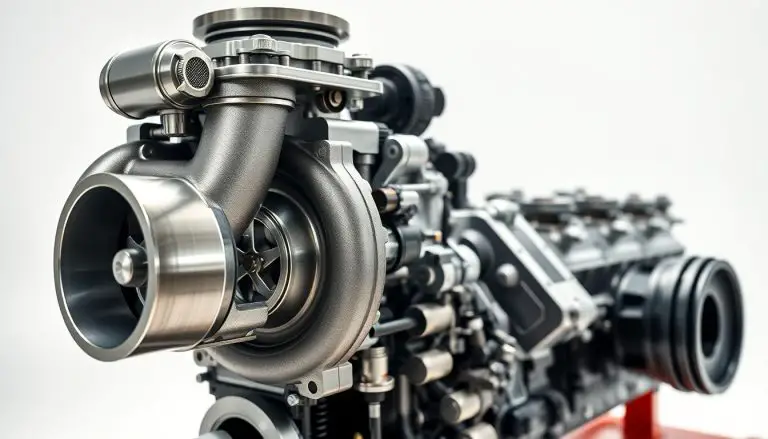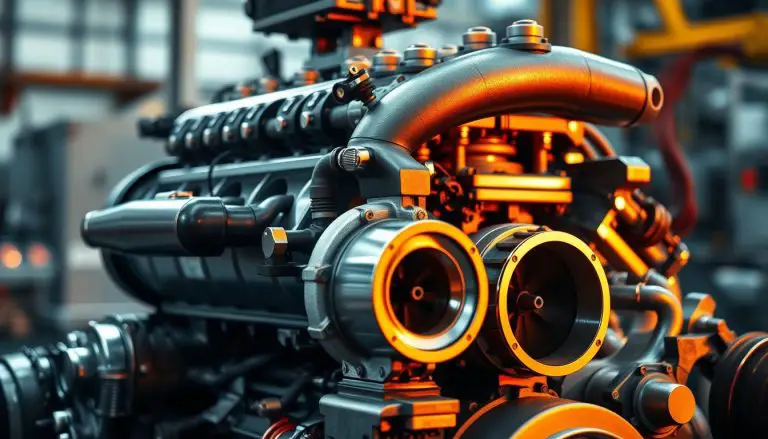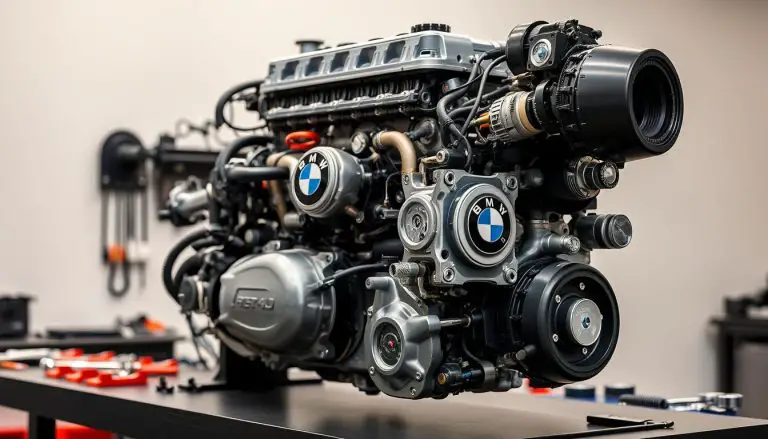A rattling noise emanating from your vehicle’s engine necessitates immediate attention. The urgency lies in pinpointing the noise’s origin to avert potential engine deterioration.
The engine noise diagnosis entails a meticulous examination of components such as the timing belt, valves, and piston rings. A comprehensive inspection is crucial for uncovering the primary cause of the car engine rattling noise.
Grasping the underlying reasons for a rattling engine noise is paramount for effective mitigation. This article delves into the prevalent causes of this phenomenon.
Key Takeaways
- Identify the source of the rattling noise to prevent further damage
- Check various engine components, such as the timing belt and valves
- Understand the common causes of car engine rattling noise
- Take corrective action to resolve the issue
- Consult a professional mechanic for a thorough engine noise diagnosis
Understanding Engine Rattling Sounds
The phenomenon of an engine emitting rattling sounds is frequently indicative of a more profound issue that necessitates prompt attention. The intensity and pitch of these sounds can fluctuate, underscoring the importance of discerning their etiology.
How to Identify the Source of Rattling
Attentive listening to the rattling sound is paramount in ascertaining its origin. Does the sound emanate from the engine’s upper or lower regions? Does it persist or does its cadence alter in tandem with engine velocity? Employing a mechanic’s stethoscope or a long screwdriver as a makeshift stethoscope can facilitate the precise identification of the source.
When Rattling Indicates Serious Problems
In certain instances, rattling may herald serious engine maladies, such as deteriorated rod bearings or a dislodged timing chain. The presence of additional symptoms, including diminished power output or unusual oscillations, necessitates an immediate inspection by a professional mechanic.
| Symptom | Possible Cause | Severity |
|---|---|---|
| Rattling noise when starting the engine | Low engine oil level or pressure | High |
| Rattling noise that changes with engine speed | Loose or worn timing chain | Medium |
| Rattling noise accompanied by loss of power | Worn rod bearings or piston slap | High |

10 Reasons Why Your Car Engine is Making a Rattling Noise
The onset of a rattling noise from your car engine necessitates immediate identification of the underlying cause to avert potential damage. This phenomenon can stem from a multitude of factors, each requiring a distinct approach to rectification. Grasping the essence of these causes is paramount for an effective resolution.
Reason1: Low Engine Oil Level or Pressure
Engine rattling noises frequently emanate from insufficient engine oil levels or pressures. Engine oil serves as a critical lubricant for the engine’s mechanical components. In scenarios where the oil level is suboptimal or pressure is insufficient, metal-to-metal friction ensues, culminating in a rattling sound.
Symptoms and Diagnosis
Indicators of low engine oil levels or pressures include a discernible decline in engine performance and the presence of a rattling noise, notably when the engine is in a cold state. The diagnostic process entails verifying the oil level and employing a pressure gauge to assess oil pressure.
Case Study and Solution
A car owner encountered a rattling noise emanating from the engine area. Upon closer inspection, it was determined that the engine oil level was below the minimum threshold. Rectification involved replenishing the oil to the recommended level, which promptly eliminated the rattling noise. Preventative measures such as regular oil changes and vigilant monitoring of oil levels are imperative to avert such malfunctions.

Reason2: Loose or Worn Timing Chain
A loose or deteriorated timing chain can also precipitate a rattling noise in your car engine. The timing chain is responsible for synchronizing the crankshaft and camshaft rotations. When it deteriorates or becomes loose, it may skip teeth or rattle, resulting in audible engine noise.
Symptoms and Diagnosis
Manifestations include a rattling noise emanating from the engine’s front, predominantly during startup or when accelerating. The diagnostic procedure involves examining the timing chain for wear and assessing its tension.
Case Study and Solution
A vehicle exhibited a rattling noise attributed to a loose timing chain. The timing chain was adjusted, and the worn-out tensioners were replaced. Post-intervention, the engine noise significantly diminished, and the vehicle’s performance was notably enhanced.
Internal Engine Component Issues
Internal engine components, when faulty, can cause a distinct rattling noise. This section will explore two significant internal engine issues: worn rod bearings and piston slap.
Worn Rod Bearings
Worn rod bearings are a common cause of engine rattling. They play a crucial role in reducing friction between moving parts. When they wear out, they can cause a rattling or knocking sound.
Symptoms and Diagnosis
Symptoms of worn rod bearings include a persistent knocking or rattling noise, notably when the engine is under load. Diagnosis typically involves checking the engine oil level and pressure, as well as using specialized equipment to listen to the engine’s sounds.
Key diagnostic steps include:
- Checking engine oil level and pressure
- Using a stethoscope or diagnostic tool to listen for abnormal sounds
- Inspecting the rod bearings for wear
Case Study and Solution
A case study on a vehicle with a rattling engine noise revealed worn rod bearings as the cause. The solution involved replacing the worn bearings and adjusting the engine’s lubrication system.
The repair process included:
- Draining the engine oil
- Replacing the rod bearings
- Refilling with the correct type of engine oil
| Symptoms | Diagnosis | Solution |
|---|---|---|
| Knocking or rattling noise | Check engine oil level and pressure, use diagnostic tools | Replace worn rod bearings, adjust lubrication system |
Piston Slap
Piston slap is another internal engine issue that can cause a rattling noise. It occurs when the piston moves slightly in the cylinder, hitting the cylinder walls.
Symptoms and Diagnosis
Symptoms include a slapping or rattling noise, notably when the engine is cold. Diagnosis involves checking the piston and cylinder for wear, as well as inspecting the engine’s overall condition.
Diagnostic steps for piston slap:
- Inspecting the piston and cylinder for wear
- Checking engine oil consumption
- Using diagnostic tools to listen for piston slap
Case Study and Solution
A vehicle with a noticeable piston slap was diagnosed and repaired by replacing the pistons and cylinders. The engine’s performance was restored, and the rattling noise was eliminated.
The repair involved:
- Disassembling the engine to inspect pistons and cylinders
- Replacing worn pistons and cylinders
- Reassembling the engine and testing its performance
| Symptoms | Diagnosis | Solution |
|---|---|---|
| Slapping or rattling noise | Inspect piston and cylinder, check engine oil consumption | Replace pistons and cylinders |
Fuel and Air System Problems
When your car’s engine commences making a rattling noise, fuel and air system malfunctions are frequently the primary culprits. These issues can result in inefficient engine performance, manifesting as unusual noises. It is imperative to comprehend the potential causes and their solutions to maintain your vehicle’s health.
Reason5: Faulty Fuel Injectors
Faulty fuel injectors are a prevalent cause of engine rattling noises. Inadequate fuel delivery by malfunctioning fuel injectors can lead to engine misfires, producing a rattling or knocking sound. Faulty fuel injectors may stem from clogging, corrosion, or electrical malfunctions.
Symptoms and Diagnosis
Symptoms of faulty fuel injectors include decreased engine performance, poor fuel efficiency, and the presence of a rattling noise. Diagnosis typically involves the use of a scan tool to check for trouble codes and a fuel injector test to identify malfunctioning injectors.
Case Study and Solution
A common case involves a vehicle with clogged fuel injectors due to dirty fuel. The solution entailed cleaning the fuel injectors with a specialized cleaning kit and replacing the fuel filter to prevent future clogging. In severe cases, replacement of the faulty fuel injectors may be necessary.
Reason6: Intake Manifold Leaks
Intake manifold leaks are another significant cause of engine rattling noises. An intake manifold leak allows unmetered air to enter the engine, causing an imbalance in the air-fuel mixture. This imbalance can lead to engine misfires and rattling sounds.
Symptoms and Diagnosis
Symptoms of an intake manifold leak include a hissing sound near the intake manifold, decreased engine performance, and a rattling noise. Diagnosis involves inspecting the intake manifold gasket for signs of wear or damage and using a smoke test to detect leaks.
Case Study and Solution
In one case, a vehicle with a rattling engine noise was diagnosed with an intake manifold leak. The solution entailed replacing the intake manifold gasket and tightening the manifold to the specified torque. Regular inspection and maintenance of the intake manifold can prevent such issues.
Addressing fuel and air system problems promptly is essential to prevent further damage to your car’s engine. Regular maintenance, including cleaning or replacing fuel injectors and inspecting the intake manifold, can help mitigate these issues.
External Engine Components
In the quest to pinpoint the origin of an engine’s rattling, one must scrutinize the external components. These elements, subject to wear and neglect, frequently precipitate such noises.
Reason7: Loose Heat Shields
Loose heat shields are a prevalent culprit behind engine rattling. Intended to shield other parts from excessive heat, their dislodgement induces vibration and noise.
Symptoms and Diagnosis
Indicators of a loose heat shield include a rattling or clattering sound, most pronounced when the engine is cold or during acceleration. The diagnosis necessitates a thorough examination of the heat shields for any signs of looseness or deterioration.
Case Study and Solution
An investigation into a 2015 Honda Civic uncovered a loose heat shield as the source of the rattling. The remedy entailed the tightening of the heat shield and the replacement of any compromised mounts.
Reason8: Failing Belt Tensioners or Pulleys
Failure of belt tensioners or pulleys can also induce a rattling noise. Such malfunctions cause belts to vibrate, resulting in audible disturbances.
Symptoms and Diagnosis
Manifestations include a rattling or grinding sound, notably when the engine is under strain. The diagnostic process involves inspecting the belt tensioners and pulleys for wear or damage.
Case Study and Solution
An examination of a 2018 Toyota Camry revealed a failing belt tensioner as the cause of the rattling. The corrective action involved the replacement of the defective tensioner and an assessment of the belts for any damage.
Reason9: Damaged Valve Train Components
Damage to valve train components, such as lifters or rocker arms, can also generate a rattling noise. These components are vital to the engine’s functionality, and their deterioration can severely impact performance.
Symptoms and Diagnosis
Signs of damaged valve train components include a tapping or rattling noise, often most evident when the engine is cold. The diagnostic process requires an examination of the valve train components for any signs of damage or wear.
Case Study and Solution
An investigation into a 2012 Ford Mustang revealed damaged lifters as the cause of the rattling noise. The solution entailed the replacement of the damaged lifters and the adjustment of the valve clearance.
Reason10: Exhaust System Issues
Problems with the exhaust system, such as leaks or loose components, can also contribute to a rattling noise. The exhaust system’s role is to direct exhaust gases away from the vehicle, but damage can lead to noise generation.
Symptoms and Diagnosis
Indicators of exhaust system issues include a rattling or hissing noise, typically more pronounced when the engine is under load. The diagnostic process involves inspecting the exhaust system for signs of damage or leaks.
Case Study and Solution
An examination of a 2016 Nissan Altima identified an exhaust leak as the source of the rattling noise. The solution involved repairing the leak and replacing any damaged components.
| Reason | Symptoms | Diagnosis | Solution |
|---|---|---|---|
| Loose Heat Shields | Rattling or clattering noise | Inspect heat shields | Tighten or replace heat shields |
| Failing Belt Tensioners or Pulleys | Rattling or grinding noise | Inspect belt tensioners and pulleys | Replace faulty tensioners or pulleys |
| Damaged Valve Train Components | Tapping or rattling noise | Inspect valve train components | Replace damaged components |
| Exhaust System Issues | Rattling or hissing noise | Inspect exhaust system | Repair leaks or replace damaged components |
Conclusion
Engaging in regular car engine maintenance is imperative to avert engine rattling noises and to ensure the prolonged service life of your vehicle. The discussion revealed that numerous factors can precipitate engine noise, spanning from insufficient engine oil levels to the deterioration of internal components.
To avert engine noise, adherence to a meticulous maintenance regimen is paramount. This regimen should encompass routine oil changes and thorough inspections of engine components. Such proactive measures enable the early detection of potential issues, thus averting the escalation into more severe and financially burdensome repairs. This, in turn, preserves your vehicle’s operational efficiency.
Efficient engine noise prevention necessitates the immediate resolution of any anomalies. Should you encounter any unusual engine noises, seeking the expertise of a professional mechanic is advisable. Their diagnostic and repair interventions can mitigate the problem effectively. By prioritizing car engine maintenance, you can anticipate a more tranquil and efficient driving experience, alongside the prolonged service life of your vehicle.
FAQ
What are the common causes of a rattling noise in a car engine?
The causes of a rattling noise in a car engine encompass a variety of factors. These include a low engine oil level or pressure, which can lead to mechanical stress. Loose or worn timing chains, as well as worn rod bearings, contribute to the noise. Piston slap, faulty fuel injectors, and intake manifold leaks also play a role. Loose heat shields, failing belt tensioners or pulleys, and damaged valve train components further exacerbate the issue. Exhaust system problems are another common culprit.
How do I identify the source of the rattling noise in my car engine?
Identifying the source of the rattling noise requires a systematic approach. Begin by listening attentively to the sound, as this can provide initial clues. Next, check the engine oil level, as low levels can indicate underlying issues. Inspect the timing chain and look for signs of wear on internal engine components. If these steps do not yield results, consulting a mechanic for a professional diagnosis is advisable.
Can a rattling noise in my car engine be a sign of a serious problem?
Yes, a rattling noise can signify a serious problem. Worn rod bearings or piston slap, for instance, can lead to significant engine damage if not addressed promptly. These issues require immediate attention to prevent further deterioration.
How can I prevent engine rattling noise?
Preventing engine rattling noise is achievable through regular maintenance. This includes checking engine oil levels, replacing worn timing chains, and inspecting internal engine components. Adhering to a maintenance schedule can help mitigate the risk of rattling noises.
What are the symptoms of faulty fuel injectors?
Faulty fuel injectors manifest through several symptoms. These include decreased engine performance, rough idling, and a rattling or knocking noise. If you suspect faulty fuel injectors, it is crucial to have them diagnosed and replaced by a qualified mechanic.
Can a loose heat shield cause a rattling noise in my car engine?
Yes, a loose heat shield can cause a rattling noise, often noticeable when the engine is cold or under load. Inspecting and securing or replacing the heat shield can resolve the issue, restoring engine quietness.
How do I diagnose a rattling noise caused by exhaust system issues?
Diagnosing a rattling noise caused by exhaust system issues involves a thorough inspection. Look for loose or damaged components, such as heat shields, exhaust pipes, or mufflers. Repairing or replacing these components can effectively resolve the rattling noise.
What are the consequences of ignoring a rattling noise in my car engine?
Ignoring a rattling noise can have severe consequences. It can lead to more extensive engine damage, decreased performance, and potentially costly repairs. Prompt diagnosis and addressing the issue are essential to prevent further damage and maintain engine longevity.


